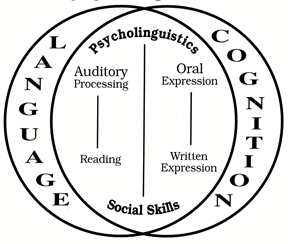What is a Psycholinguistic Evaluation?
The purpose of a Psycholinguistic Evaluation is to assess all of the areas of a child's language system that are important for being successful in school. These areas include, but are not limited to, the following:
- understanding/processing spoken language
- oral expression
- reading
- written expression
- phonological processing
Does my child need an evaluation?
How will you know if your child requires a Psycholinguistic Evaluation?
To help you to determine a need, we have organized learning behaviors into the following four categories:
- Listening Comprehension
- Expressive Language
- Reading
- Written Expression
Listening Comprehension
Does your child show any of the following difficulties:
- understanding what is being said around and to him/her
- retrieving words (recalling the names of common objects and/or events)
- pronouncing words
- understanding directions
- comprehending stories that are read to him/her
Does your child process information slowly, and require additional time in order to respond to directions or questions?
Does your child misinterpret information?
Does your child require constant repetition and/or clarification of information?
Does your child's vocabulary seem immature for his/her age?
Expressive Language
Does your child:
- have difficulty getting to the point?
- move on to the next idea before finishing the first idea?
- have trouble with common irregular, grammatical forms? For example, "catched" for caught.
- have difficulty with sequencing information?
- tend to focus on irrelevant details while telling a story?
- have difficulty relating new learning to prior information and making relevant associations?
- have difficulty taking another person's perspective while relaying information?
- have difficulty using language appropriately in social situations?
- have difficulty formulating concise, grammatically correct sentences?
- have difficulty explaining daily activities such as what occurred at school?

Reading
Are your child's reading skills not consistent with other academic skills?
Despite having a good sight word vocabulary, does your child have difficulty decoding unfamiliar words?
Is there a lack of fluency and automaticity while reading connected text orally?
Does your child:
- disregard punctuation while reading orally?
- confuse sounds in words?
- make errors based on structural confusions? (for example, "butter" for better)
- guess unfamiliar words rather than attempting to decode them?
- have difficulty with reading comprehension?
- have difficulty following written direction?
- have poor phonological processing skills (for example, sound/symbol relationships, sounding out the individual letters in words)
Written Expression
Does your child:
- write in incomplete sentences?
- use incorrect/inappropriate capitalization and punctuation?
- confuse word endings?
- tend to spell most words phonetically?
- misspell the same word incorrectly in more than one way in the same paragraph?
Do your child's spelling errors seem atypical? For example, instead of "enuf" for enough, does your child spell it "eneafe".)
In your child's writing, is there a lack of elaboration and salient supporting details?
Does your child have difficulty with noun/verb agreement?
Does your child have difficulty reading what he/she has written?
Is your child's written text organized in a non-sequential manner?
Does your child's writing show a lack of appropriate story grammar usage (beginning, ending, characters, setting, actions, and proper integration and sequencing of these elements).
Does your child have difficulty with prewriting skills (for example, brainstorming, webbing)?
Does your child have an awareness for basic mechanical elements such as appropriate use of capitals at the beginning of a sentence, and a period at the end of a sentence.
Payments
We accept private payment, BCBS of New Hampshire (Anthem BCBS), and most other insurance.
